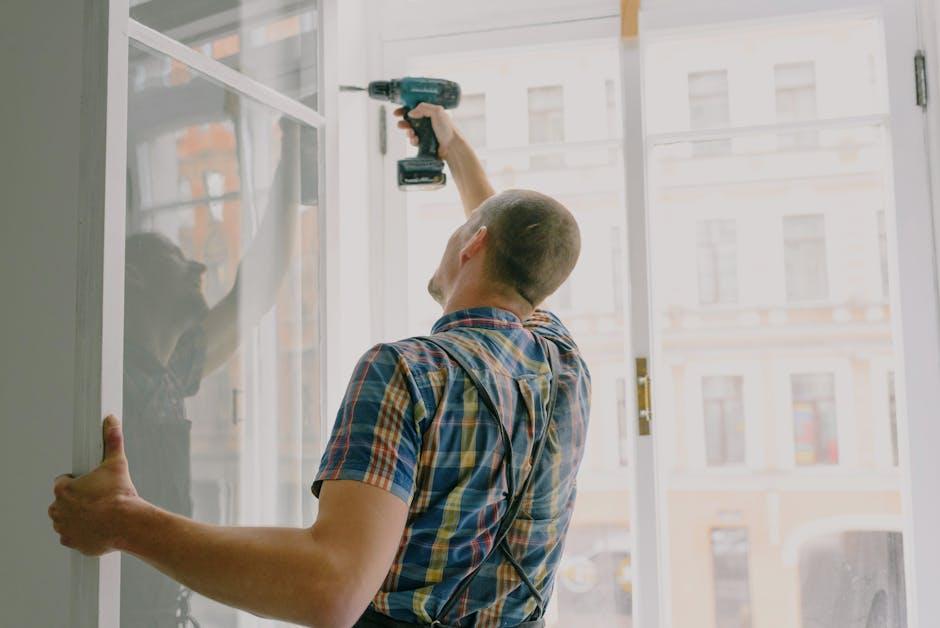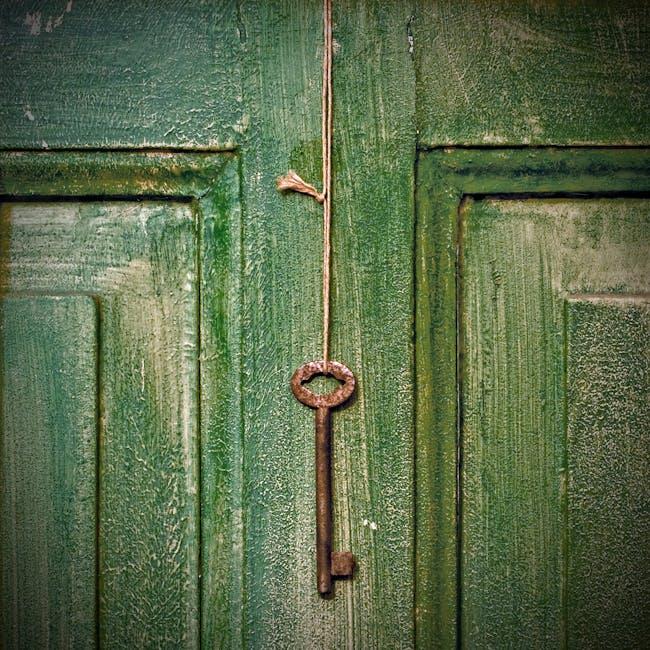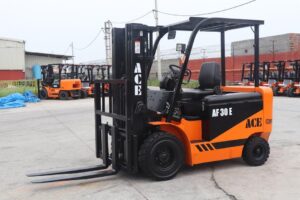In the bustling Twin Cities, the need for quick fixes can sometimes tempt even the most cautious among us to take matters into our own hands-especially when it comes to stubborn locks. The idea of drilling your own lock might seem like a straightforward, cost-saving solution to regain entry or ensure security. Yet, beneath the surface of this seemingly simple task lies a maze of potential hazards and unintended consequences. Before you reach for that power tool, it’s worth exploring why drilling your own lock is a decision best left to the professionals-and how a thoughtful approach can save you time, money, and a lot of frustration.
Table of Contents
- The Hidden Risks of DIY Lock Drilling in Urban Areas
- Understanding the Damage Beyond the Surface
- How Professional Locksmiths Handle Locked Doors Safely
- Legal and Financial Consequences of Unauthorized Lock Tampering
- Choosing Reliable Local Experts for Emergency Lockouts
- Q&A
- Wrapping Up

The Hidden Risks of DIY Lock Drilling in Urban Areas
Attempting to drill your own lock in busy urban environments might seem like a quick fix, but the risks extend far beyond just damaging your property. Many locks, especially high-security ones found in Twin Cities homes and businesses, contain delicate pins and mechanisms designed to resist tampering. When drilled improperly, these locks can become permanently damaged, often requiring full replacement rather than simple repair. Additionally, the debris and metal shavings from drilling can lodge deep within the lock cylinder, causing jamming and potentially creating a false sense of security. Urban dwellers must also consider the noise pollution: an unattended drilling job can easily draw unwanted attention from neighbors or passersby, potentially causing legal or social complications.
Moreover, DIY lock drilling often ignores the bigger picture of urban safety. In densely populated areas, compromised locks might make emergency access difficult for first responders or neighbors attempting to assist. Without professional expertise, there’s also a higher chance of accidentally triggering more advanced security features like alarms or lockout systems, which can escalate costs or risks. Below is a quick comparison table highlighting key differences between professional and DIY lock drilling outcomes:
| Aspect | Professional Drilling | DIY Drilling |
|---|---|---|
| Damage Risk | Minimal and controlled | High, often irreversible |
| Security Impact | Maintained or improved | Compromised or lost |
| Noise Level | Managed and discreet | Loud and attention-grabbing |
| Emergency Access | Ensured | Uncertain or blocked |
- Noise pollution can lead to unwanted disturbances or complaints.
- Local laws may restrict or penalize lock tampering without proper authorization.
- Potential safety hazards from improper tool handling in crowded areas.

Understanding the Damage Beyond the Surface
Drilling a lock seems like a quick fix, but it often causes damage that runs far deeper than the visible scratches or broken shards. Beneath the surface, the internal components of the lock mechanism can become warped, jammed, or even shattered. This not only renders the lock unusable but can also significantly increase repair costs. What’s worse, the damage may extend to the door frame or surrounding hardware, leading to a domino effect of costly restoration efforts.
Here are some of the hidden damages that DIY drilling can cause:
- Misaligned pins and tumblers: Even slight misplacement can lock the mechanism permanently.
- Broken springs: Essential for smooth operation, springs can snap under improper pressure.
- Compromised security: Drilled locks often lose their resistance against forced entry.
| Damage Type | Potential Impact | Professional Fix? |
|---|---|---|
| Internal Component Jamming | Lock becomes inoperable | Yes – often requires replacement |
| Door Frame Damage | Weakens overall door security | Yes – may involve carpentry work |
| Loss of Structural Integrity | Increased vulnerability to break-ins | Yes – lock and door replacement |

How Professional Locksmiths Handle Locked Doors Safely
Professional locksmiths approach locked doors with a blend of expertise, precision, and respect for the integrity of your property. Before attempting any physical intervention, they perform a thorough assessment of the lock’s type and condition. This careful evaluation allows them to select the safest unlocking method, minimizing damage and preserving the lock whenever possible. Rather than relying on destructive tactics, they use specialized tools like tension wrenches, pick guns, or electronic key programmers designed to manipulate locks delicately and efficiently.
Key safety techniques professionals employ include:
- Non-invasive lock picking to avoid unnecessary damage
- Using lock bypass tools when suitable
- Employing clean entry methods, such as bump keys or decoder tools
- Replacing or rekeying locks only when absolutely necessary
Additionally, locksmiths understand the nuances involved in door and frame construction. They take precautions to avoid compromising the door’s structure, which can lead to costly repairs or security weaknesses. Their methods not only restore access but also maintain your property’s appearance and long-term safety, distinguishing professional service far above reckless attempts like drilling.

Legal and Financial Consequences of Unauthorized Lock Tampering
Attempting to force your way through a lock without professional guidance can lead to significant legal repercussions. In many jurisdictions, unauthorized tampering with locks-especially on rental properties, shared spaces, or commercial establishments-is considered illegal and can result in fines or even criminal charges. Property owners may view drilling into a lock as vandalism or destruction of property, opening the door to lawsuits or eviction notices. It’s essential to understand that even seemingly minor actions like drilling a lock can spiral into complex legal battles, putting your personal and financial reputation at risk.
Beyond the legal risks, the financial fallout from DIY lock tampering can be substantially more costly than hiring a licensed locksmith. Drilling often destroys the entire locking mechanism, necessitating a full replacement that could run into hundreds of dollars-far exceeding a professional service call. Additionally, if damage extends to doors, frames, or security systems, repairs can quickly inflate the expenses. Consider the following comparison table that outlines typical costs associated with professional locksmith services versus unauthorized drilling:
| Service Type | Typical Cost Range | Risk Level |
|---|---|---|
| Professional Locksmith Opening | $75 – $150 | Low |
| DIY Drilling and Replacement | $300 – $600+ | High (damages & fines) |
| Repair of Surrounding Damage | $150 – $400 | Moderate to High |
- Legal fines can accumulate quickly.
- Unintended damage inflates repair costs dramatically.
- Professional services include warranties and insurance coverage.

Choosing Reliable Local Experts for Emergency Lockouts
When you’re locked out, the urgency to regain access can tempt you to take drastic measures, like drilling your lock. However, relying on qualified local locksmiths in the Twin Cities guarantees a safer and more efficient solution. These professionals carry the right tools and have the expertise to handle all types of locks, ensuring minimal damage and a quick resolution. Moreover, their familiarity with regional lock brands and security systems means they can also offer valuable advice on upgrading your current setup for enhanced protection.
Choosing your locksmith wisely means considering several important factors. Look for:
- Verified credentials and licensing, which confirm their legitimacy and training.
- 24/7 availability, as emergencies don’t follow a schedule.
- Transparent pricing, to avoid unexpected fees after the job.
- Positive customer reviews, showing proof of reliable service.
| Criteria | Why It Matters | Example |
|---|---|---|
| Licensing | Guarantees professional training and compliance | Local government-issued locksmith license |
| Availability | Ensures help at any hour | 24/7 emergency hotline |
| Pricing | Prevents surprise costs | Upfront written estimate |
| Customer Feedback | Reflects quality and trustworthiness | 5-star Google reviews |
Q&A
Q: Why is drilling your own lock a bad idea?
A: Drilling a lock might seem like a quick, do-it-yourself fix when you’re locked out, but it’s actually destructive. It permanently damages the lock, requiring a full replacement, and can lead to costly repairs or even door damage. Plus, without the right tools and expertise, you risk injury or further complications.
Q: Aren’t there tutorials online showing how to drill locks? Why shouldn’t I trust them?
A: Online tutorials often showcase professionals or experienced locksmiths, but they don’t emphasize the risks involved for amateurs. The average person lacks the specialized tools and knowledge to safely drill a lock, which can result in damaging your door frame, trigger a security alarm, or compromise home safety.
Q: What are the alternatives to drilling my own lock in the Twin Cities?
A: In the Twin Cities, numerous 24/7 locksmith services specialize in non-destructive entry methods. These professionals use techniques like lock picking, bump keys, or electronic access solutions, which preserve your lock’s integrity and ensure your property remains secure.
Q: Could drilling my lock void the warranty or insurance coverage?
A: Absolutely. Many lock manufacturers void warranties if the lock is tampered with or drilled. Moreover, insurance companies might refuse claims if damage was caused by improper attempts to forcibly enter your own property, potentially leaving you with out-of-pocket expenses.
Q: Is drilling a lock safe in terms of personal injury?
A: Drilling locks involves working with power tools in tight, sometimes awkward spaces, increasing the risk of slips, cuts, and eye injuries. Without proper protective gear and training, you could hurt yourself or cause accidental damage to the door or nearby surfaces.
Q: What if the lock is old or broken-wouldn’t drilling be simpler than waiting for a locksmith?
A: Even with old or stubborn locks, professional locksmiths have experience and specialized tools to handle challenging cases without unnecessary damage. It’s usually faster and less costly in the long run to call a pro than to risk creating a bigger problem through drilling.
Q: How can I prevent lock emergencies and avoid needing to drill or break in?
A: Regular lock maintenance, having spare keys with trusted neighbors or family, upgrading to smart locks with backup access options, and keeping contact info for local locksmiths handy can save you from stressful lockouts and eliminate the temptation to drill.
Q: What’s the main takeaway for Twin Cities residents about drilling locks?
A: When it comes to locks, patience and professional help beat brute force every time. Drilling your own lock may seem tempting, but it often leads to more damage, higher costs, and safety risks. The advice from local experts: call a trusted locksmith first-your locks, doors, and peace of mind will thank you.
Wrapping Up
In the end, while the allure of a quick fix might tempt you to grab a drill and tackle that stubborn lock yourself, remember that what seems like a simple solution can quickly spiral into costly damage or compromised security. The Twin Cities offers a wealth of professional locksmiths ready to help-experts who bring precision, experience, and respect for your property. So, before you reach for the power tools, take a moment, breathe, and let the pros handle the drill. Your doors, your wallet, and your peace of mind will thank you.




